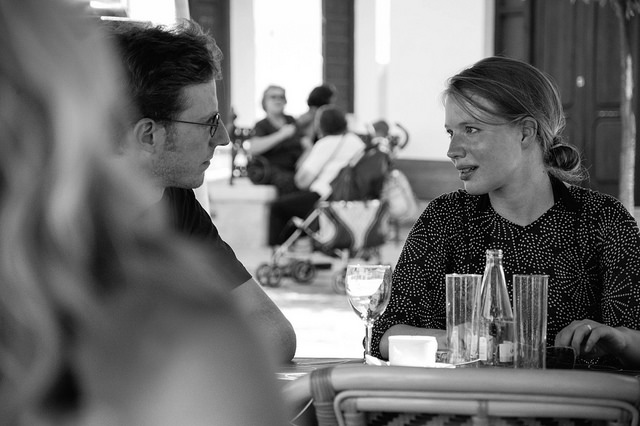Warning: naughty language ahead!
Many of us have gone through crappy love relationships that didn’t work out. It’s part of the process of finding the right fit.
But when we’re clinging to a relationship that is poisoning our soul, then it has taken a step beyond incompatibility.
There are people we just don’t gel with and then there are toxic people. The ones who I believe have so much self-loathing they overflow with ick.
I have both been with this awful person in a love relationship, and have been this damaged/damaging person in a relationship. Either way, it was no cup of yerba matte.
With a lot of self-help, I managed to find a way off that path. (Hey, at least I knew I was messed up.)
Recently, I came across this fun and enlighten-me essay by one of my favourite authors in the get-myself-better-better-best-self-ever field, Karen Salmansohn, and realized how far I’ve come from those woe-is-he/whoa-me days.
(Reprinted with permission:)
Warning! This story includes a naughty word—however, this word is necessary because its shock-value is what catapulted me to change my life. I share this naughty word now with only the most loving intentions—hoping it might be an empowering caffeinated jolt to any sleeping spirits out there!
About a decade and a half ago I used to joke that for me all dating should be re-named ‘blind-dating”—and instead of saying I was “seeing someone right now,” I should be more honest, and say, “I’m dimly viewing someone.”
I remember I was once “dimly viewing” this particular guy. I’ve written about him before. I explained how every time I said this guy’s name, my girlfriends would sing the theme song to Batman. Not because this man looked great in black Spandex tights. No, no. It was because he was a bad man.
“Dadadadadadada Bad-man! Bad-man!” my girlfriends would sing, right after I’d finish telling a particularly bad Bad-man episode—of which there were many.
Let’s call this ex of mine “Bruce Wayne”—-to protect his not-so-innocent secret identity.
Today I want to share something I never told you about Bruce.
Ready?
Bruce’s “dadadadadada bad-behavior” began very early on—a few weeks into our relationship. Yep, right out of the gate Bruce displayed what I felt were highly controlling and paranoically jealous behaviors.
Yet I continued to date him.
I even went away with Bruce for a week long vacation in Turkey where we had a very big fight one evening. I made a silly joke to our Turkish waiter, who then laughed and touched my shoulder before he left our table. Bruce then became convinced that I was flirting with this Turkish waiter. He specifically wanted to know if I’d rather be dating this waiter—a man who could barely speak English abd lived well beyond a 5,000 mile radius of my zip code. I kept reassuring Bruce I was not the teeniest bit interested in this Turkish dude yet Bruce refused to talk to me for a full two days of our vacation!
When I came home from vacation, I sought out therapy. I found a nice older psychotherapist, named Sid, who eventually became like a “grandfather from another great-grand-mother.” I adored Sid.
“You’ll never believe what Bruce said/did last night,” I’d begin each and every therapy session. And then I’d launch into another “Dadadadadadada Bad-man” episode.
“Bruce said he doesn’t want me to have brunch with girlfriends on weekends anymore unless he comes along.”
“Bruce told me he doesn’t want me to take an evening painting class because he thinks I just want to meet someone.”
“Bruce told me he doesn’t want me to go to the gym because he thinks I just want to meet someone.”
“Bruce told me he doesn’t like it when I come home happy from work because he worries I enjoy work more than him! He actually became angry the other day because I came home so happy!”
Each week I’d tell Sid story after story, quickly followed by rationalization after rationalization—always explaining why I should stay with Bruce.
“You know what your problem is Karen?” Sid asked me one session. “You’re so smart, you’re stupid.”
I laughed. “What’s that supposed to mean?”
“You are able to over-think things so much that you wind up talking yourself out of what you already know.”
“So you think I should break up with Bruce?” I asked.
Sid sighed loudly. “I’m a therapist. I’m not supposed to tell you what to do. But if you want my honest opinion, I can’t believe you’re gonna stay with him, when he’s an asshole.”
“Wow! I can’t believe you just called Bruce an asshole,” I said. “But you’re right, he is an asshole.”
“Actually, I didn’t call him an asshole! I called you an asshole. You heard me wrong. I said, ‘If you continue to stay with Bruce, then you are an asshole.’”
“What? I’m not the asshole! Bruce is the asshole!”
“At this point, Karen, if you stay with Bruce knowing what you know, then you are the asshole.”
“I’m the asshole?” I repeated this word out loud—a word as opposite in content as a mantra could ever be but alas, more powerful than any mantra I’d ever used.
This word “asshole” became my wake up call!
Sid was right. If I stayed with someone who was so toxic to my well being, then I became the asshole to me—for allowing this soul-crushing, freedom-squelching relationship to continue!
“Listen, Karen,” Sid said, “at this point in therapy we are simply wasting time talking about Bruce and how messed up he is. Quite frankly, you are only using stories about Bruce to distract yourself from your real issues and the important inner work you have to do on yourself. It’s time we talk about the white elephant in the room: your wounds! There’s obviously something very wounded inside of you, that you feel the need to stay with Bruce when he is so toxic.”
Although this story happened well over a decade ago, I think about it often. I particularly think about it whenever I’ve found myself starting to enter into what I intuit might be a toxic relationship—be it in love, business or friendship.
I feel if we’re not careful we can all find ourselves wasting a lot of precious tick-tocking time complaining about how badly someone is behaving toward us.
I believe we need to stop asking questions like:
“Why is this person treating me this way?”
“Why did this person do that crappy thing to me?”
“What is wrong with this person?”
“Are they an asshole?”
“Are they a sociopath?”
“Are they a narcissist?”
“Isn’t this person simply just a terrible person?”
The really important questions we should be asking instead are:
“What did I miss in the vetting process that I allowed this person into my life?”
“What is wounded inside me that I choose/chose to stay with this person for as long as I do/did?”
“How can I grow from this experience so it doesn’t repeat itself into a bad pattern?”
“Do I want to make this a story about how I was a victim or how I became a victor?”
“Do I want to waste my time, thoughts and energy on toxicity or use it for a higher purpose?”
“Aren’t I wise and strong for how I moved on to be with better people and live better days?”
If we’re presently caught up in telling stories about the toxic misbehaviors of someone, the time has come to stop getting caught up in name-calling, contempt and blame.
The time has come to recognize you’re just distracting yourself with all the drama, chaos and static!
Yep, the more we stay with and/or complain about a toxic person, the more we’re merely delaying doing the important inner work we need to do to heal our wounds, expand our limiting beliefs, and show ourselves far more love and respect.
All of this time expended on them could be time spent on expanding us—growing who we are!
Our lesson: Don’t be an asshole. Stop staying with (and/or complaining about) toxic people. Choose to focus our time, energy and conversation around people who inspire, support and help us to grow into our happiest, strongest, wisest selves.
Here’s a link to the original essay above, written by Karen Salmansohn including her high potency quote posters that go with this essay.
Relephant:
7 Signs Your Friendship May be Toxic
Love elephant and want to go steady?
Sign up for our (curated) daily and weekly newsletters!
Editor: Catherine Monkman
Photo: Karsten Bitter/Flickr



Read 8 comments and reply